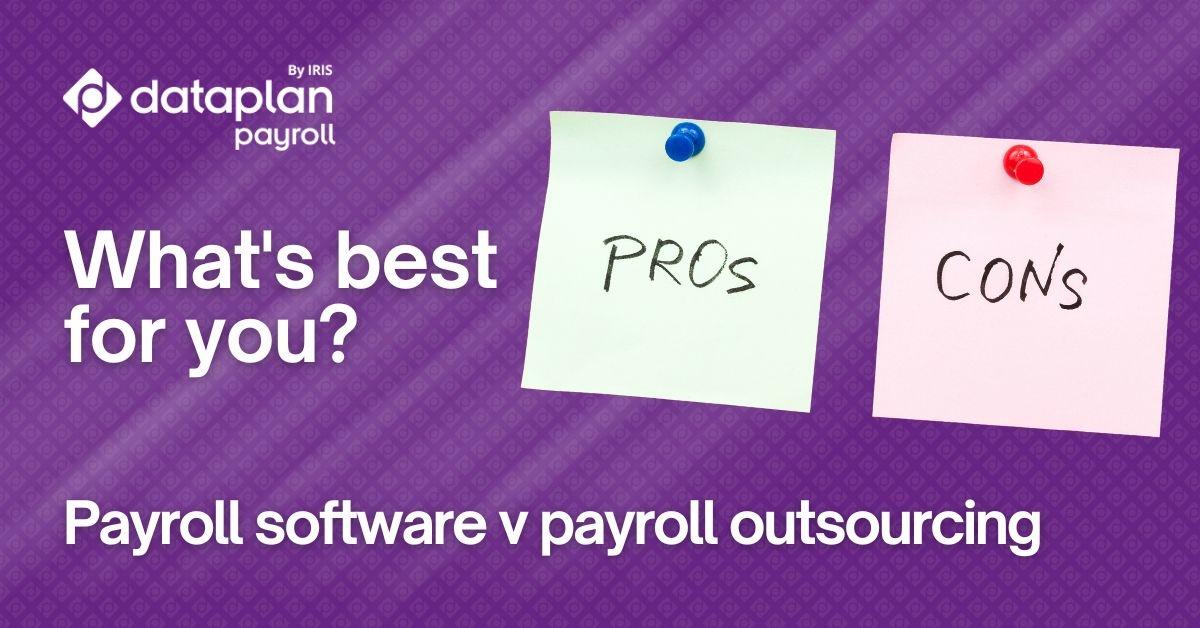
In an age of interconnected systems, it’s easy to think that all we need is top-notch payroll software, and we're good to go.
But these new cloud-based computing and interconnected payroll systems were invented for a reason: the world is getting more complex.
As we’ll see, the next-generation software solutions that are rising to this challenge are still best used by substantial teams of professionals that are completely confident with payroll.
The choice between in-house payroll vs outsourcing – what's changed?
As the world has become more complicated, the goalposts for effective payroll management have moved closer together.
Consequently, old decisions about resource allocation haven't disappeared; they are just different.
In the past, there were always three options when it came to paying your staff. Managers mulled over sticking with tried-and-tested systems, moving to new tech, or payroll outsourcing.
Now, that same decision has narrowed; “tried and tested” is no longer an option. A new, more focused decision has to be made between buying new tech or using payroll outsourcing services.
The world has changed, and we have to move with it.
How did payroll become more complex?
The short answer is the pandemic pushed in-house payroll capacity to the brink, forcing innovation.
Payroll teams found themselves firefighting new legislation and thinning staff numbers as job relief schemes were introduced to shift people away from offices. The question, during the toughest time for payroll in living memory, was how to make systems more agile and, where possible, cater for teams working remotely.
This led some business leaders to consider the pros and cons of keeping things in-house while leveraging modern software that could be used remotely.
Now, the Global Payroll Complexity Index Report states that 62% of organisations are now using cloud-based software to process their payroll (vs on-premise), up from 34.8% in 2019. This shift towards cloud-based solutions has helped save time and streamline payroll processes.
Others, however, have seen the benefits of outsourcing and believe managed payroll services are a better fit for either some or all of their needs. Overall, 61% of respondents to the Global Payroll Complexity Index Report have chosen this route.[CE1]
The reason? You still need to know a lot about payroll before you can use the software.
Why new complexities need payroll expertise
Software [AC2] alone will not keep you on top of modern payroll challenges, and unfortunately, you can’t blame them for any gaps in your knowledge.
If you have comprehensive, in-house payroll expertise, you’ll be fine. If not, then tapping the know-how of an external payroll company becomes crucial.
Only an in-depth understanding will help you navigate an ever-changing payroll landscape. In your own business, wages change. New legislation means tax bands shift, as do employer obligations for pensions and staff benefits. If you miss, for example, the ongoing changes to benefit-in-kind rates on company electric cars, then good luck explaining to HMRC why you relied on software to keep on top of the law. They will fine you for any mistakes. Likewise, an annoyed staff member will not be placated when you tell them your computer program messed up their tax.
And we have to be on the ball even more now there’s a cost-of-living crisis. Helping staff get through this difficult time isn’t about software; it’s about getting creative with benefits and pay. You will need a mix of business savvy, good payroll practice and tax smarts. Without it, you won’t be able to offer your staff resources that cost very little to your business but will make all the difference to them.
Against this economic backdrop, businesses are still expanding geographically. This isn’t just a case of growth based on success; it’s also a case of hiring remote staff when you struggle to find a good local fit. We don’t have to go far to see how this could complicate matters. Scotland, for instance, has a different tax regime from the rest of the UK. An up-to-date understanding of UK and international tax will make employing staff in other countries pain-free, but a lack of know-how will create stress every month, even with the right software package.
Of course, a smooth-running payroll doesn’t just rely on a baseline knowledge of tax. It requires a depth and breadth of expertise. Your business needs Gender Pay Gap specialists (to help with reporting compliance if you have more than 250 staff), pensions specialists (to help process staff and work with providers) and HR experts (to advise on employment law and staff procedures). If you're in the hospitality sector, you might need to set up a Tronc to save money and remain compliant with an upcoming law on tips.
In-house, the danger is this knowledge is held by only one person at best. Chaos will ensue if there’s a problem and that one person is ill, on holiday or has moved on to new pastures. If you want more than one person with this expertise, it will take a serious bite out of your budget.
Meanwhile, the more digital our world has become, the greater the onus has been on payroll teams to lock down their data and adhere to regulations. If you’re an IT expert, that’s OK. If you’re not, you’ll always have a level of uncertainty as to whether people’s pay and other details are being stored safely. This more demanding setup can be exploited by increasingly sophisticated bad actors. You can learn more about that here.
You don’t have to suffer payroll pain alone
Does any of this sound tricky? Don’t worry about it: you’re not alone.
It’s a common error that, because you’ve successfully built or are running a business, you feel you should know about all the details of payroll. But your business isn’t payroll – it earns you no new clients, and it doesn’t look after them.
So maybe it’s time to think about outsourced payroll services.
The power of payroll outsourcing
Outsourced teams should have all the know-how you’ll ever need, from international payroll to auto-enrolment and beyond. The best are geared towards the task at hand, with a comprehensive setup that won’t miss a beat. They aren’t scrambling to buy new software, and if they know what they’re doing, then their setup is built around them – and you.
Despite this sophistication, a good outsourcing solution should not be a fixed overhead. It can work with your existing team and calibrate to the task in hand, scaling up or down depending on the pay run.
Enter Dataplan
Dataplan by IRIS has been here since 1969. We let businesses and schools see their payroll process working for them, from start to finish, using a secure cloud-based portal. You can even log in and make changes, and we’ll check to make sure they’re compliant.[AC3]
Our hi-tech solution, driven by a dedicated team of qualified payroll, pension and tax experts, gives us the power to deliver on-time, accurate pay for you and your staff.
Click here for more information about Dataplan Payroll and learn how we can help you.
Note this is a non-Dataplan/IRIS link [CE1] [CE1]
I think we should talk about software rather than apps as most payroll software will be run on desktop [AC2]
We need to weave in the fact that for people choosing in-house then do they have the depth and breadth of expertise? We have tax speciialists, Gender Pay Gap specialists, pensions specialists, HR specialists, in addition to our payroll processors, we don't expect our processing staff to have in-depth knowledge of all these specialisms. [AC3] [AC3]
Also, having in-house staff makes a business vulnerable to key staff members being off sick, on holiday or leaving. Unless you have a very large payroll team a business is unlikely to have the bandwidth to absorb key people being off. that is one of the main benefits of outsourcing, peace of mind that there is always someone there to do the job!
Dataplan are one of the UK’s leading providers of specialist payroll and associated services.
From payroll outsourcing and pension service management to ePayslips and gender pay gap reporting; we have a solution for you and your business.
